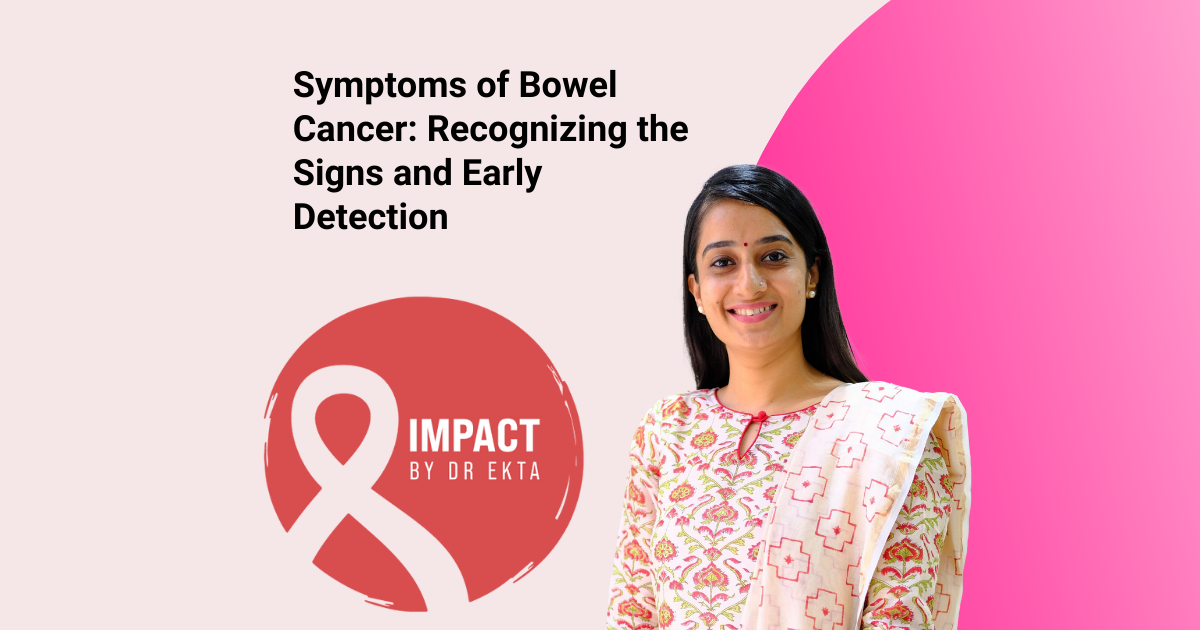As an oncologist, one of the most critical aspects of my work is to ensure that individuals are well-informed about the symptoms of bowel cancer. Early detection can significantly improve treatment outcomes, and understanding the warning signs is paramount in catching the disease in its nascent stages. In this blog, I will detail the symptoms of bowel cancer, emphasizing the importance of early detection and regular screenings.
Understanding Bowel Cancer
Bowel cancer, also known as colorectal cancer, originates in the colon or rectum. It is one of the most common types of cancer and, unfortunately, also one of the leading causes of cancer-related deaths. However, with early detection, the prognosis for bowel cancer can be significantly improved. Recognizing the symptoms of bowel cancer is crucial for early intervention and successful treatment.
Common Symptoms of Bowel Cancer
- Persistent Changes in Bowel Habits: One of the most noticeable symptoms of bowel cancer is a persistent change in bowel habits. This can include diarrhea, constipation, or a change in the consistency of your stool. If you notice that your bowel habits are not returning to normal after a few days, it is essential to consult a healthcare professional.
- Rectal Bleeding or Blood in Stool: Another significant symptom of bowel cancer is rectal bleeding or finding blood in your stool. This can appear as bright red blood or darker stools, indicating bleeding higher up in the colon. Any unexplained bleeding should be evaluated promptly.
- Abdominal Discomfort: Persistent abdominal pain, cramps, or discomfort can also be symptoms of bowel cancer. This pain may be accompanied by bloating or a feeling of fullness. If you experience ongoing abdominal discomfort, it is important to seek medical advice.
- Unexplained Weight Loss: Sudden and unexplained weight loss is a symptom that should never be ignored. It can be indicative of various health issues, including bowel cancer. If you find yourself losing weight without a change in diet or exercise, it is crucial to discuss this with your doctor.
- Fatigue and Weakness: Feeling constantly tired or weak can be a symptom of bowel cancer. This can result from anemia caused by bleeding in the digestive tract. If you are experiencing unexplained fatigue, it is essential to get a thorough evaluation.
Less Common Symptoms of Bowel Cancer
While the aforementioned symptoms are the most common indicators of bowel cancer, there are other, less common symptoms that can also be associated with the disease:
- Iron Deficiency Anemia: Chronic bleeding from the bowel can lead to iron deficiency anemia. Symptoms of anemia include fatigue, paleness, and shortness of breath. If you have been diagnosed with anemia, it is important to investigate the underlying cause.
- Narrow Stools: A change in the shape of your stool, particularly if it becomes narrow, can be a symptom of bowel cancer. This change can result from a tumor obstructing the passage of stool through the colon.
- Incomplete Bowel Movement: A sensation that your bowel doesn’t empty completely, even after a bowel movement, can also be a symptom of bowel cancer. This feeling can be caused by a tumor in the rectum.
Importance of Early Detection
Recognizing the symptoms of bowel cancer is just the first step. Early detection through regular screenings can significantly improve the chances of successful treatment. Here are some key points to consider regarding early detection:
- Screening Recommendations: It is generally recommended that individuals begin regular screenings for bowel cancer at age 50. However, those with a family history or other risk factors may need to start earlier. Speak with your healthcare provider about the appropriate screening schedule for you.
- Types of Screenings: There are several types of screenings available for detecting bowel cancer, including fecal occult blood tests (FOBT), colonoscopy, and sigmoidoscopy. Each of these tests has its advantages and limitations, and your healthcare provider can help determine which is best for you.
- Importance of Regular Screenings: Regular screenings are vital because they can detect precancerous polyps, which can be removed before they develop into cancer. Additionally, screenings can detect cancer at an early stage when treatment is most effective.
Taking Action
If you recognize any of the symptoms of bowel cancer in yourself or a loved one, it is crucial to take immediate action. Here are the steps you should follow:
- Consult a Healthcare Professional: If you experience any of the symptoms of bowel cancer, schedule an appointment with your doctor as soon as possible. Early evaluation and diagnosis are key to successful treatment.
- Follow Through with Recommended Screenings: Adhere to the screening schedule recommended by your healthcare provider. Regular screenings are an essential part of preventive healthcare and can save lives.
- Maintain a Healthy Lifestyle: While there is no guaranteed way to prevent bowel cancer, maintaining a healthy lifestyle can reduce your risk. This includes eating a balanced diet rich in fruits, vegetables, and whole grains, exercising regularly, avoiding tobacco, and limiting alcohol consumption.
Conclusion
As an oncologist, I cannot stress enough the importance of recognizing the symptoms of bowel cancer and seeking early detection. The symptoms of bowel cancer can be subtle and easily overlooked, but being vigilant about changes in your body can make a significant difference. If you notice any persistent changes in bowel habits, rectal bleeding, abdominal discomfort, unexplained weight loss, or fatigue, do not hesitate to consult a healthcare professional. Early detection through regular screenings is the most effective way to catch bowel cancer in its early stages and improve treatment outcomes. Remember, your health is your most valuable asset—prioritize it by staying informed and proactive about the symptoms of bowel cancer.

